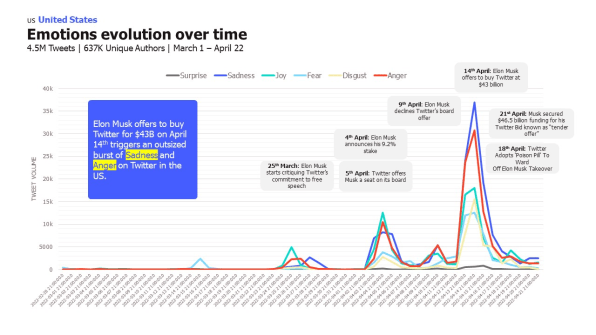Twitter loves Musk but dreads a Musk takeover, research finds
Twitter’s board has agreed to sell the company to Elon Musk, who will take it private. The deal was announced just hours after researchers at Tufts University revealed that Twitter users may not share in Musk’s enthusiasm for a Musk-owned Twitter.
A sentiment analysis of 4.5 million tweets shows that while Twitter users very much enjoyed Elon Musk’s tweets criticizing the social media platform, their joy turned to sadness and anger when the multibillionaire tweeted his intention to buy the social network.
The researchers analyzed tweets from people in five countries—the U.S., U.K., India, South Africa, and Nigeria—as the Musk/Twitter drama unfolded in March and April.
Tufts’ Bhaskar Chakravorti, who led the research, says the best way to look at the results is by focusing on three days—the day Musk began questioning Twitter’s commitment to free speech on Twitter (March 25), the day Musk announced he owned more than 9% of Twitter shares (April 4), and the day when Musk announced his $43 billion bid to buy the company and take it private (April 14).

Chakravorti, who is dean of global business at Tufts’ Fletcher School, points out that the biggest sentiment expressed in tweets about the first two events was “joy” (see the blue-green line in the chart). And while a significant number of Twitter users expressed “joy” when Musk announced his offer, a far greater number tweeted sentiments of “sadness” and “anger” (the blue and red lines, respectively.)
The April 14 spike in negative sentiment may be echoed again today with the news that Twitter has accepted Musk’s offer. (Fast Company will update the story if and when that analysis becomes available.)
It’s very unlikely that the Twitter board considered the Tufts analysis when evaluating Musk’s bid. It is possible that it conducted its own analysis.
The board has a fiduciary responsibility to shareholders to respond to a good offer, Chakravorti said before Monday’s announcement, but it also has a responsibility to the Twitter community.
Its ultimate decision may reflect the balance it seeks to strike “between free speech and respectable speech on the platform,” as Chakravorti put it.
Musk is a libertarian who characterizes Twitter as a “town square” and believes that people should, for the most part, be able to say anything they want there. Critics of the deal fear that this position will only lead to more toxic content on the platform. It might also lead to a content-moderation regime dictated by fewer people and with less public transparency.
“This is a raw expression of where Twitter draws the line,” Chakravorti said of Twitter’s decision. “Should we hand over control to one single, admittedly talented, individual, or should we have open scrutiny and moderation?”
This exchange continues to haunt me pic.twitter.com/W06oSqx0MR
— Dave Smith (@redletterdave) April 25, 2022
The Tufts sentiment analysis suggests that Twitter community has serious doubts about how a private, Musk-controlled Twitter might evolve. “I think they would rather have a transparent, publicly traded platform than a privately held company run by one person who has been a bit erratic on the platform,” Chakravorti said.
It’s also possible that the Twitter board may have attached speech and content moderation conditions to the deal.
Twitter users can expect to see changes to the kind of content they see in their feeds. They may gain the ability to edit their tweets after they’re live.
It may take a while, but the tenor of the discourse on matters such as health and politics on Twitter will change, too. Whether that makes Twitter more, or less, friendly to democratic values remains to be seen.
I hope that even my worst critics remain on Twitter, because that is what free speech means
— Elon Musk (@elonmusk) April 25, 2022
(25)


